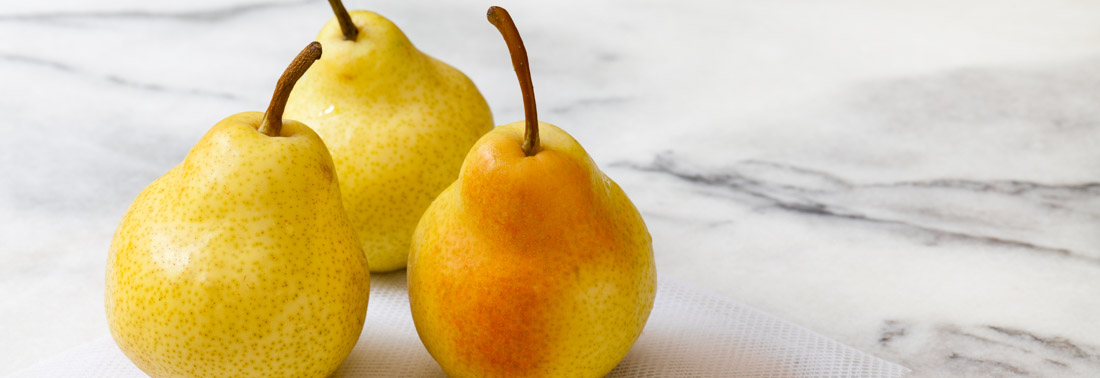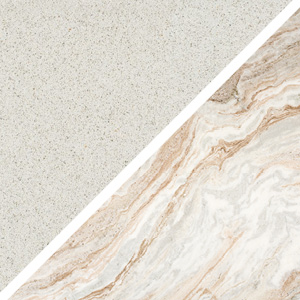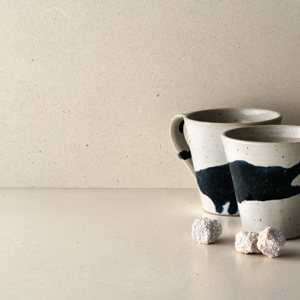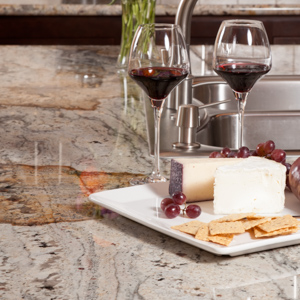
Caring for Your Marble Kitchen Countertop
Once found only in the most exclusive homes, marble has become a much more accessible material thanks to modern technology and quarrying processes. The maintenance and care you give your marble countertop will be similar to other natural stones like granite, travertine, or soapstone, however, marble does have a few particularities that you’ll need to watch out for.
Marble is a metamorphic rock made from crystallized limestone. The stone is well suited to polishing and can be polished to have a mirror-like finish. However, because marble is so prone to etching by acidic substances, which destroys the polish by corroding the stone, polishing is only recommended for use in powder rooms, fireplace surrounds, or furniture pieces. For kitchen countertops or bar areas, a matte finish is recommended because any etching that might occur is less noticeable.
When it comes to baking, marble is the countertop of choice. But overall, marble kitchen countertops are extremely high maintenance. That said, any natural stone surface can be damaged, and many people who choose marble for their kitchen prefer the natural aging process and believe that any scratches or other wear marks add to the essential character of their home.
Best practices for caring for your marble countertop:
Clean up spills quickly
Acidic substances like citrus juices, tomato sauce, wine, coffee, and soda can etch marble, not to mention stain the surface. While your marble countertop should be sealed upon fabrication (and periodically thereafter) it will behoove you to clean up any spills quickly.
Use a soft cloth or sponge and a marble cleaning spray
Definitely don’t use any abrasive cloth or substance to clean your marble countertop. It’s best to use a soft cloth or a sponge. Use hot water or a cleaning spray made for marble to keep your countertop looking its best. Don’t leave standing water on the surface; be sure to wipe dry with a cotton towel or chamois.
Mild dish soap won’t harm your marble countertop, but repeated use will cause a soapy build-up (even with thorough rinsing) that will dull the shine of your countertop. You should also refrain from using any generic or common household cleaning products such as bleach, glass cleaner, or degreasers, and do not use vinegar, ammonia, or citrus cleaners. These products are acidic and will etch the marble.
Use cutting boards, hot pads, and coasters
As we mentioned above, marble is the countertop of choice for rolling out dough, but do not chop vegetables directly on the surface; use a cutting board to protect both your countertop and your knives. You’ll avoid the possibility of scratching the marble, not to mention that cutting on stone is a good way to quickly dull the blades of your knives.
Marble is also prone to scorching, so be sure to have plenty of trivets or hot pads on hand to use when you take hot pots and pans off the stove.
Because marble is so prone to etching (and marble restoration is not inexpensive), use coasters at all times for glasses, bottles, and cans. If you keep certain bottles on the countertop, make sure to use a decorative tray to protect against etching caused by leaks or spills.
Don’t sit or stand on a granite countertop
Marble, granite, and quartz countertops are extremely hard, but they are not flexible. With the advent of modern kitchen design and the desire by homeowners for a clean, homogenous look in their kitchens, many stone countertops are now installed directly onto the cabinets (built with a hard top), without a layer of plywood. You could crack your countertop by sitting or standing on it, placing too much weight in one spot.
Reseal when necessary
Most marble countertops will need to be resealed periodically. This is not a difficult process, but it’s important to buy a quality sealer—this is not the place to economize.




